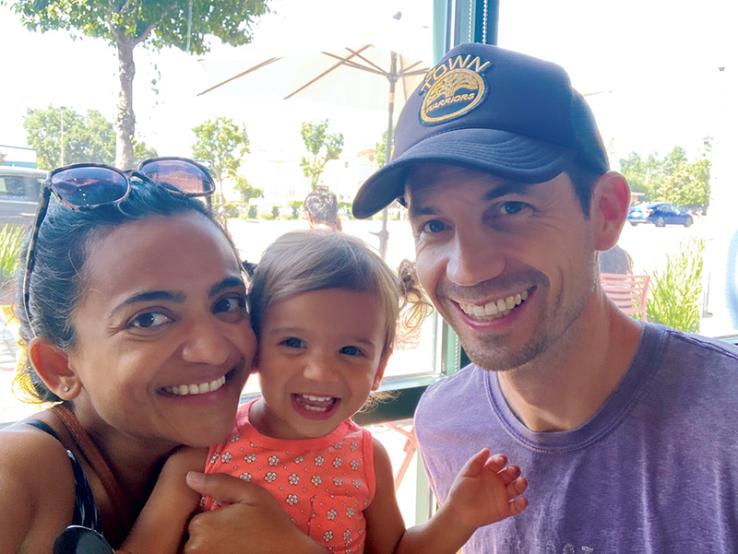Miles Patrie *16’s house in Lahaina, Hawaii, was one of the more than 2,200 structures that burned down during the Maui wildfires in August, and he was one of several Princetonians impacted by the tragedy.
“The fire came down so fast,” Patrie told PAW via email after the nation’s deadliest wildfire in the last century. As of early September, 115 people had been confirmed dead, with hundreds more still unaccounted for.
Watch a video of Miles Patrie *16’s home after the fires.
The morning of Aug. 8 was normal, Patrie said, other than the power going out around 5 a.m. His family had no concerns about fire until 4:30 p.m., when his wife, Aparna, spotted smoke. They left their home within 10 minutes with their 18-month-old, Maya, losing cell reception just as they pulled out of their driveway. They picked up their sons Aidan, 8, and Max, 5, on the way to the house of a friend who had agreed to shelter them.
In the immediate aftermath, and without knowing whether their home was still standing, Patrie and his family were desperately searching for their au pair, Noelia, who hails from Argentina and was temporarily living with the Patries. She had been out of the house with friends when the family made the quick decision to evacuate.
That night, Patrie attempted to go back to his neighborhood several times in search of Noelia, but he was denied entry every time by police. “That was the toughest part,” he said. The next day, he and his wife drove to a neighborhood that they knew Noelia’s friends lived in, and she happened to see them walking down the street. “It was such a relief,” said Patrie.
Two days later, after finally being allowed back into their neighborhood, Patrie “saw that our house was completely gone. It was a hole in the ground. Only the concrete foundation and some of the concrete block walls were left. Almost the entire neighborhood was incinerated.”
They lost almost everything, though Patrie said “overall we feel very fortunate that we are safe.”
As of early September, Patrie’s family was still living with friends, but they will soon be moving into a rental home. His two boys are back at their regular school, which has “provided them with some normalcy,” but Patrie said in general, “things are still in flux for a lot of families in West Maui.”
Jeffrey Kuhn *81, who lives less than two miles from some of the worst-hit areas, was without power, water, phone, and internet access for four days. In the aftermath of the incident, he opened
his home to three additional people and two dogs.
“We had it quite lucky, I think,” said Kuhn, a professor and astronomer at the University of Hawaii. “We’re all still in shock about what’s going on in Lahaina. Nobody really understands how this could happen.”
One of the homes that burned down close to Kuhn’s was owned by a former postdoc of his on a street that Kuhn himself lived on a few years ago.

“It’s a connected ecology of people that appreciates and is trying to work through whatever we can to make life more bearable for those that were most directly affected,” he said.
Kuhn said there’s also “a lot of anger and a lot of recognition of how many different ways our government let us down.” Maui’s Emergency Management Agency administrator, Herman Andaya, resigned from his post after originally defending the decision not to sound emergency sirens during the fires.
Ben Angarone ’21, a reporter for the Honolulu Civil Beat, witnessed the devastation firsthand when he visited Maui two weeks after the fire on assignment, calling the sight “gruesome.”
“You could still smell the ash, and just looking off to the side [of the road], you could see the grayed-out landscape, cityscape, and the cars that were just … husks,” he said.
Angarone and his colleagues have continued to report on the many challenges ahead including potentially toxic contamination, where and how to rebuild, and the displacement of many people who lost everything.
Della Au Belatti ’96, who lives a few islands over on Oahu, is a member of Hawaii’s House of Representatives and sits on the Committee for Health and Homelessness.
“There’s going to need to be a tremendous amount of rebuilding of that community. It’s going to take a lot of resources,” she said.
Her priorities at first focused on the short-term — getting people their needed medicine and health treatments, for example — but she’s also thinking ahead to the rebuilding of clinics and schools. “From a policymaker’s perspective, recovery is going to be a marathon,” said Belatti.
PAW talked to several Hawaiians who urged tourists to return to the parts of the island that are still open. “With the lack of tourists [in Maui] right now, we are seeing people getting laid off,” said Angarone.
Belatti and Patrie also encouraged those who wish to help to make donations to vetted organizations such as the Hawaii Community Foundation Maui Strong Fund.
Belatti and Patrie encouraged those who wish to help to make donations to vetted organizations such as the Hawaii Community Foundation Maui Strong Fund.

